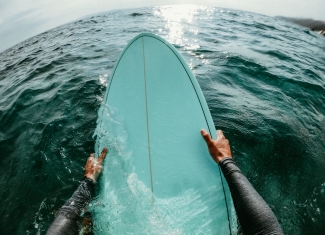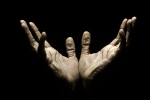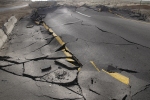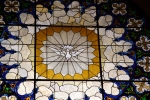March 2020
Beyond the Red Doors
Surfing and Spirituality
It’s 7:15 am on a Wednesday morning, and I am kneeling in the sand with a dozen students from the University of California, Santa Barbara. Despite the bright sun in the cloudless sky, the air temperature is 46°F and many of us are shivering. Ten yards in front of us, a great blue heron fishes in the tide pools. In a minute, we will disperse into the water and surf the waist high wind swell in the February sun. For now, we mirror the stillness of the heron as we kneel in the sand.
Riding waves and quality down time
This is Surfing & Spirituality – a weekly program of the Episcopal campus ministry at UCSB. We meet at 7 am every Wednesday, rain or shine, waves or no waves. It is open to university students of all skill levels. The only requirement is confident swimming ability. In addition to surfing, we take on a spiritual practice or theme each week. These practices vary from paying attention to our breath to reflecting on grace. Often, the theme reflects the season or the surf conditions. On Ash Wednesday, the practice was “Remember that you are water and to water you shall return.” After I introduce the practice, we sit in silence for a few minutes. Then we hit the water.
Most mornings, I stay behind with newcomers. First, I give them basic instructions on paddling, board positioning and survival tactics. When they are ready, I walk them out to where the waves are breaking and push them into a wave. Invariably, the new surfers are overcome with elation at their first wave. When they finish their rides, some holler; some laugh; some just fall into the water. But the one constant is the grin. There is nothing quite like riding a wave.
One of the best parts of Surfing & Spirituality is the down time. Very little time in surfing is spent riding waves. The average ride for a beginner lasts only a few seconds. The majority of our time together is spent walking to the surf, preparing gear or waiting for a set to appear on the horizon. Those transitional moments make for deep conversation. It is then that students share their struggles with addiction, relate the pain of losing a parent, discuss hardships related to sexual identity and check in on a deeper level. The rare combination of a life-giving activity and quality down time is what makes Surfing & Spirituality a vital ministry.
A diverse and changing group
Year after year, we draw a diverse group of students. We get prototypical surfers like Charlie, who is both our group intern and also drummer in the church band on Sundays. There are exchange students from China, England, Spain and France. There are DACA students who come to us through the church’s work on food insecurity. There are two students who lead the university’s Dungeons & Dragons gathering. One graduate student studies piano performance and her boyfriend studies physics. We have students from film studies, education, sociology and accounting.
The group has a penchant for nicknames, like “OG,” “Kahuna,” and “Small Fry.” The boards also get nicknames – “Big Red,” “The Green Machine” and “Curious George.” Most weeks, people from our group bring a friend or two to join the fun. Several graduate students have brought their partners, and I will officiate at the weddings of two of these pairs this summer.
The struggle for us is keeping the group small enough to manage. A typical week includes 12-25 students. At the end of every year, as we say goodbye to old friends and prepare for new ones, the group continues to flourish through these transitions.
A community that enriches the spirit
At a school known for its party culture, Surfing & Spirituality offers a distinct shift from the norm. The early start requires that students leave their dorms before sunrise. Somehow they manage to make it out even when it is cold and rainy. Most mornings, they’re rewarded with a brilliant sunrise overlooking the Pacific Ocean and the Channel Islands. Then we spend the morning surfing and celebrating each other’s little victories. There are a lot of high fives and hoots. By the time we pack up, we are all energized for the day ahead.
Surfing enriches spiritual practice in many ways. Simply stepping into the ocean makes notions of interdependence and mystical unity tangible. Cold water encourages parasympathetic states and helps us develop compassion. Careful attention to breaking waves calls for focus akin to traditional mindfulness practices. Surfing can also lead to sublime experiences in which we recognize a power much greater than ourselves.
Spiritual practice enriches surfing, too. Surfing can easily turn territorial, and surfers’ hunger for waves can be akin to addiction. When the waves are small or conditions are poor, longtime surfers can find deeper satisfaction by considering gratitude and the church’s thinking on scarcity and abundance. The restorative qualities of water that many surfers observe overlap with baptismal theology. In these ways, our tradition can bring language to experience that fringes on the ineffable.
Surfing & Spirituality is not a gimmick to trick people into coming to church. Yes, there are students that attend both Sunday worship and Wednesday surfing, but Surfing & Spirituality is its own community, one that is spiritually satisfying for those who attend. Many young adults are hungry for Christ but have no interest in church. Surfing gives them an opportunity to explore that spiritual longing in a way that complements and informs traditional church offerings.
It is noteworthy that no one who coming to Surfing & Spirituality has ever asked, “Where is God in this?” or “How is this spiritual?” They don’t have to. When we paddle out in the ocean with a group of loving people, the answers are there.
Click here for a list of Covid-19 resources on ECF Vital Practices.
The Rev. Scott Claassen is the Episcopal chaplain to UCSB and vicar of St. Michael’s University Church. He is the husband of Maribeth – a Certified Nurse Midwife and Women’s Health Nurse Practitioner – and father of Henry (6), Jimmy (4), and baby Amos. A fifth generation Californian, Scott grew up in Monterey County. After studying Spanish Literature and Philosophy at Vanderbilt University in Nashville, Scott worked as a musician until a renewed call to ministry brought him to Yale Divinity School, where he investigated the relationship between religion and ecology. Ordained to the priesthood in 2014, Scott served at Thad’s in Santa Monica before coming to St. Mike's in the fall of 2015. When not working or with his family, Scott can be found surfing, exploring wilderness, playing music or dreaming of new ways to make a love-spreading difference in the world.
Resources:
- The Spirituality of Authentic Leaders by Bill George, Vestry Papers, January 2004
- Getting to Know the Daily Office by Linda Buskirk, ECF Vital Practices blog, July 6, 2015
- Communication is mission: Connection by Richelle Thompson, ECF Vital Practices blog, February 29, 2012
- Suddenly Single: Cooking for One by Linda Privitera, ECF Vital Practices blog, February 7, 2012







